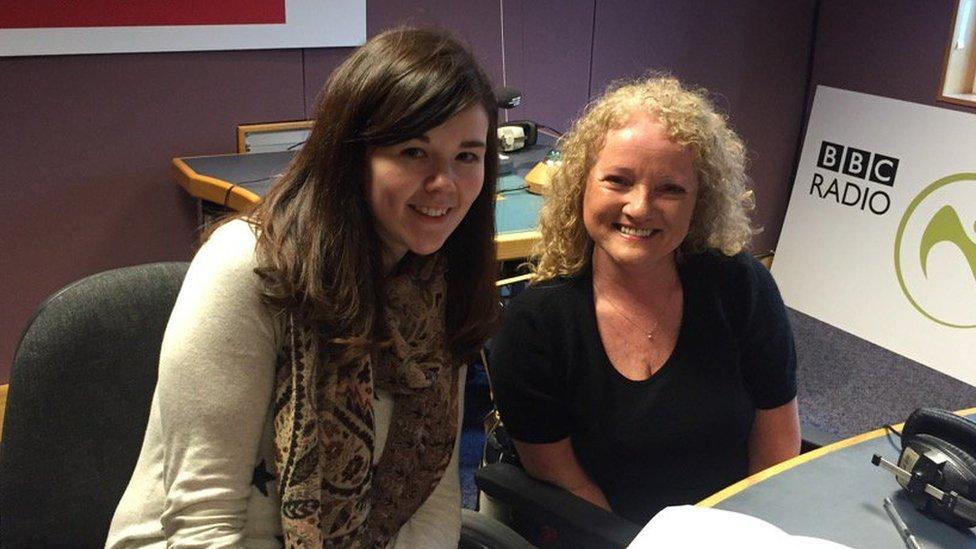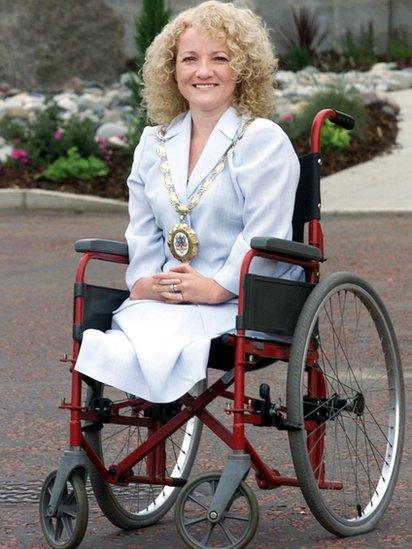Thalidomide: Kim Fenton on compensation campaign for survivors of damaging drug
- Published

Kim Fenton (right) told The Sunday News presenter Jayne McCormack about her struggle to cope with her weakening body
Living without hands or legs is a nightmarish thought that few of us have to live out in reality.
But for Belfast woman Kim Fenton, that is what she has to deal with on a daily basis.
She was born without legs and with deformed hands after her mother was given an anti-morning sickness drug during her pregnancy.
That drug, Thalidomide, caused babies to be born with limb defects as well as damaged eyes, ears and internal organs.
Now Kim, who is part of a campaign seeking a financial settlement to help her and others affected by the drug, has said she has hope that a BBC television drama will help increase awareness of their fight for compensation.
History
The drug was developed by German pharmaceutical company Grunenthal in the late 1950s.
Hailed as a wonder drug on its release, it was withdrawn in the UK three years later after tests revealed it disrupted foetal development.
By that time, it had already proved devastating for the thousands of babies around the world who suffered its effects, as well as their families.
More than 50 years on, BBC One's Call The Midwife is now tackling the dark history of the Thalidomide scandal.
In an episode airing on Sunday night, a baby is born suffering the effects of Thalidomide, after a doctor prescribed the drug for her mother.
Expectations
And Kim said she hopes the storyline will "capture the trauma and the heartache of our parents at the time".
"I'm delighted that this part of history has been remembered and that a younger generation will know our story," she told BBC Radio Ulster's The Sunday News.

Kim was elected as mayor of Castlereagh in June 2001
Throughout her life, Kim has taken pride in her ability to life an independently against the odds.
There were "no expectations when I was born", she said, but she went on to enter politics and become the mayor of Castlereagh Borough Council.
But like many other Thalidomide victims, Kim's quality of life has been worsening over the last 20 years as her body breaks down, and her mother still lives with a feeling of guilt at having taken the drug.
Disintegrating
"We've been deteriorating rapidly, it's had a huge impact our lives.
"The majority of us suffer severe pain each and every day - that affects our mobility and also our flexibility.
"We've constant tingling and numbness in our hands, feet and fingers.
"We're losing strength, we can't grip as well as we used to, our bones are disintegrating and we have nerve damage."
Kim and other campaigners want the German government to explain whether it protected Grunenthal directors and staff from prosecution in the 1970s.
They want the government in Germany to properly compensate survivors born with deformities in the 1950s and 1960s.
Support
"We have had settlements from Distillers [the company that produced and marketed the drug in the UK], but only a small amount of us received that.
"Most recently we've had payments from our own government, a yearly sum to help us with our deterioration in our health."
Those grants have been "life-changing" to Kim.
"[But] we've never been compensated," she said.
Prime Minister David Cameron has given his support to the campaign, and Kim said success feels closer than ever, but there is still work to do.
Even throughout the pain, Kim is determined to continue that battle.